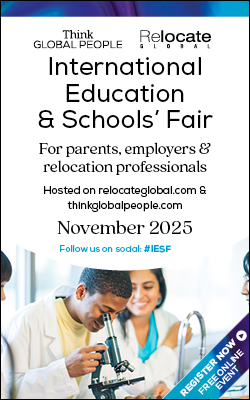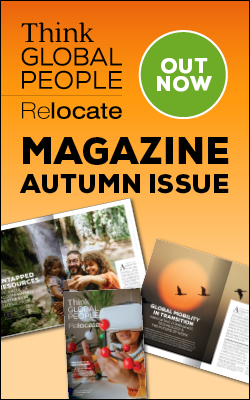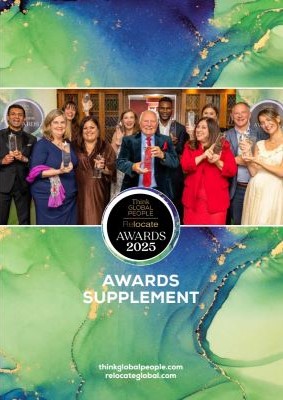Where next for women working internationally?
The ‘Inspiring Global Women for Growth’ gathering was a welcome return to Relocate Global’s popular in-person honouring of International Women’s Day. Held at the Institute of Directors, this impactful Think Women network event celebrated individuals’ career journeys and created a vital platform for working out ‘where next?’ for women working globally.

Related reading from Relocate Global
- Inspiring global women for growth
- Think Women's 40 Outstanding Global Women
- Think Women Podcast - Fiona Murchie and Marianne Curphey
Fiona Murchie, Relocate Global’s Managing Editor, was joined by a remarkable guest list of panellists and speakers. This included Julia Palmer of Santa Fe, Caroline Thorley-Farrer of Worley, Salma Shah, coach, author and founder of Mastering your Power, and Jenny Hinde, executive director at the Clear Company. Dr Anino Emuwa, leader of the 100 Women @Davos network, delivered a powerful endnote address.Highlighting the relevance and interconnectedness of global mobility and relocation expertise with international HR, management and education, DEI expertise, coaches and financial services expertise were also represented in the panels, workshops and round the tables in networking conversations.
Building thriving careers in the international context
Welcoming guests to the stately Waterloo Room, Fiona Murchie said the event was, “your opportunity to input into how we can accelerate equity in our international community of relocation, global mobility, people working in a global context, managers and professionals and the wonderful education sector.”Running alongside Friday’s event, and to recognise the incredible strides individuals and companies are making to embrace equity, Relocate Global’s Think Women editorial is profiling 40 outstanding women leaders over the next few months. Fourteen of them attended on Friday to inspire and share their learning in the year-round Think Women network.“Relocate Global’s 40 Outstanding Global Women initiative is to recognise the reality of where we are now, to showcase the fantastic work that is going on in international careers and to also reveal what people’s careers actually look like,” said Fiona. “There is this illusion that you go to school, graduate or get your professional qualification or training, and then everything’s uphill from there. On social media, other people might seem to be getting on and young people particularly might find themselves asking how can I achieve my dreams?“But the reality is it is not like that. As Julia Onslow-Cole – one of our leading immigration lawyers – was saying, I tell people about the mistakes, because that makes me far more real and those are what I have learnt from. To be able to encourage people to recognise and learn from their missteps and keep pushing towards their goals is very valuable, authentic advice.”Such genuine personal experiences were also shared around the tables on Friday in short workshop activities. These fostered understanding of the kind of challenges and opportunities that women are facing in the global world of work today. These included confidence-building for girls and young women and changing expectations around gender in the workplace and beyond.As guest, Dr Susan Doering, coach and author of Smart Career Moves for Smart Women, commented, that despite progress, “let’s be honest about it; it isn’t a level playing field”. Using the dance partnership between Fred Astaire and Ginger Rogers as an analogy, Dr Doering said that Ginger Rogers “had to do everything in high heels and backwards: there is no equity. Smart Career Moves for Smart Women is my contribution to helping, supporting, empowering and accompanying women to be who they want to be.“It’s about transitions, crossroads and decision-making and recognising that you have options and making the most of them. It’s about getting support and that’s what I’m hearing in the buzz here today and the support you are giving each other, which is wonderful."Embedding equity in global mobility and international assignments
For Julia Palmer, COO Relocation and CHRO of Santa Fe Relocation, making transitions across borders has been a common feature throughout her life. Julia moved at age 12 to the US, then to Thailand, back to the UK, then over to Australia with her family, when she was 17. “It built my resilience and made me very aware of the people I was talking to,” says Julia.Speaking from experience as someone who has moved with a young family for her own work, Julia recognises that women on the move often need extra help because their partner also works. “I think it’s realising that female assignees are still expected to do a lot of the moving and all the admin. There’s so much paperwork and coordinating. Having the help and support is even more important for relocating women.”Fellow panellist Caroline Thorley-Farrer has also crafted her own successful international career while raising a young family with her husband. Caroline explained how now she is drawing on her own experiences to make adjustments and improve opportunities for women to take up international assignments, as well as other under-represented groups.Improving access and experience to opportunities “is not about fixing the women” but addressing current ways of working that aren’t fit for purpose, says panellist Salma Shah, an inclusion and belonging champion and author of soon-to-be-published Diversity, Inclusion and Belonging in Coaching: A practical guide. Organisations that recognise inclusion through an intersectional lens will also benefit from the skills people have of adapting to different cultural modes and norms.Speaking after the panel, Salma continued: “When you enter the workplace as a woman and as a woman of colour, you’re entering into a certain system. As a female, you may start thinking that some things don’t go how you expect them to. You find yourself asking ‘is it me?’ I think the dialogue has to be around fixing the system. The system isn’t set up to serve me, therefore how do I own my space in a space that isn’t designed for me without losing my sense of self? At the same time, you’ve got to make the most of opportunities. But people don’t need fixing.”Emma Pears, founding director of leadership consultancy Solomon Hunt, coach and author of What Does it Matter? Live with less stress and more joy, also pointed to the importance of building confidence early on in young girls and women – a theme that came through on the roundtable discussions – as part of this. “In theory, we are educated the same and our experience is the same, but the lived experience of men and women are different. It doesn’t mean our capability is different. The expectation of how we can progress our career as women needs a dialogue I think.”For Jenny Hinde, the challenge is also one around leadership. Often, people in senior positions have achieved success because they are experts in their field and understandably struggle to find the language to talk about DEI as it relates to their business and the ESG agenda. “This is about having curiosity, empathy and creating a place of psychological safety for people to use the skills they already have rather than a tick-box exercise.”Creating belonging through communities
Bringing all the themes and conversations together, Dr Anino Emuwa, former banker and founder of 100 Women @Davos and Avandis Consulting, said that the challenge now for women is to exercise our own agency, be visible and get the attention of influencers and decision-makers.This includes networking and community building, both giving support and offering support, and ultimately breaking down barriers to progress. Among those barriers is the perception bias around female leadership. Dr Emuwa is working hard to address this through 100 Women @Davos and engaging with male allies to communicate positively about how gender equity can help solve global talent shortages.“When we are here, all together, we tend to forget that there are very few women in senior leadership,” says Dr Emuwa. “Being part of a community and for the community to decide how to interact and engage around its purpose, which we as women are very good at, we have this ability to create impact. Then we start to get visibility and attention. The more you interact with people in a friendly environment, the more it helps to bring down barriers.”Sign up now at events@relocatemagazine.com to find out more about the Think Women network
Subscribe now to Think Global People magazine and read more from Marianne Curphey on women leaders and Ruth Holmes on the talent agenda for 2023 in the brand-new winter issue
©2025 Re:locate magazine, published by Profile Locations, Spray Hill, Hastings Road, Lamberhurst, Kent TN3 8JB. All rights reserved. This publication (or any part thereof) may not be reproduced in any form without the prior written permission of Profile Locations. Profile Locations accepts no liability for the accuracy of the contents or any opinions expressed herein.






























